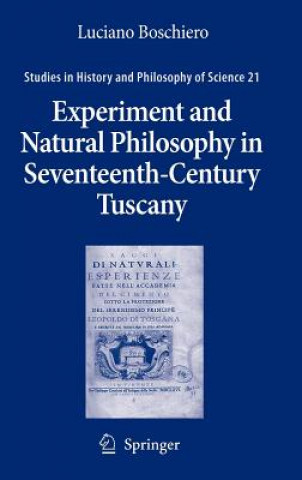
Kod: 01417346
Experiment and Natural Philosophy in Seventeenth-Century Tuscany
Autor Luciano Boschiero
The Accademia del Cimento (1657-1667) was the first institution in Europe purporting to use an experimental method in its scientific inquiries. According to some recent accounts, the Cimento belonged to a new culture of knowledge ... więcej
- Język:
 Angielski
Angielski - Oprawa: Twarda
- Liczba stron: 251
Wydawca: Springer-Verlag New York Inc., 2007
- Więcej informacji o książce

Zobacz książki o podobnej tematyce
-

I Can Learn Times Tables
85.82 zł -

Discover Countries: The EU Countries
59.73 zł -
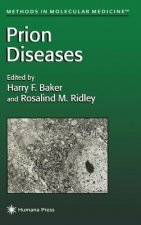
Prion Diseases
868.66 zł
Bon podarunkowy: Radość gwarantowana
- Podaruj bon o dowolnej wartości, a my się zajmiemy resztą.
- Bon podarunkowy dotyczy całej naszej oferty.
- Możesz wydrukować elektroniczny bon z e-maila a następnie przekazać go obdarowanemu.
- Ważność bonu wynosi 12 miesięcy od daty wystawienia.
Więcej informacji o Experiment and Natural Philosophy in Seventeenth-Century Tuscany
Za ten zakup dostaniesz 742 punkty
 Opis
Opis
The Accademia del Cimento (1657-1667) was the first institution in Europe purporting to use an experimental method in its scientific inquiries. According to some recent accounts, the Cimento belonged to a new culture of knowledge making that abandoned the practice of constructing theories in favour of a programme that simply accumulated matters of fact , free from theoretical arguments and speculations.§However, while the Cimento, led by Tuscany s Prince Leopoldo de Medici, created a persuasive experimental rhetoric, in actuality the academicians continued to construct experiments and interpret their results on the basis of their theoretical aims and their broader interests in natural philosophy.§This analysis begins by examining the use of experiments, mathematics, and natural philosophy in seventeenth-century Italy. Once these topics are clearly defined, it becomes easier to understand the intellectual interests and motivations of each of the Cimento s members. Case studies regarding the Cimento s work on air-pressure, the vacuum, the freezing process, and the properties and effects of heat and cold, reveal the group s natural philosophical skills, commitments, and agendas. Meanwhile, in an attempt to avoid religious pressure and to maintain an uncontroversial reputation for the academy, Leopoldo censored the academicians from publicly expressing their views on a number of issues.§The purpose of this work is to counter historiographies that search for the origins of modern science within the experimental practices of Europe s first scientific institutions, such as the Cimento. It proposes that we should look beyond the experimental rhetoric found in published works, to find that the Cimento academicians were participants in a culture of natural philosophical theorising that existed throughout Europe.This work counters historiographies that search for the origins of modern science within the experimental practices of Europe s first scientific institutions, such as the Cimento. It proposes that we should look beyond the experimental rhetoric found in published works, to find that the Cimento academicians were participants in a culture of natural philosophical theorising that existed throughout Europe.The Accademia del Cimento (1657-1667) was the first institution in Europe purporting to use an experimental method in its scientific inquiries. According to some recent accounts, the Cimento belonged to a new culture of knowledge making that abandoned the practice of constructing theories in favour of a programme that simply accumulated matters of fact , free from theoretical arguments and speculations. §However, while the Cimento, led by Tuscany s Prince Leopoldo de Medici, created a persuasive experimental rhetoric, in actuality the academicians continued to construct experiments and interpret their results on the basis of their theoretical aims and their broader interests in natural philosophy.§This analysis begins by examining the use of experiments, mathematics, and natural philosophy in seventeenth-century Italy. Once these topics are clearly defined, it becomes easier to understand the intellectual interests and motivations of each of the Cimento s members. Case studies regarding the Cimento s work on air-pressure, the vacuum, the freezing process, and the properties and effects of heat and cold, reveal the group s natural philosophical skills, commitments, and agendas. Meanwhile, in an attempt to avoid religious pressure and to maintain an uncontroversial reputation for the academy, Leopoldo censored the academicians from publicly expressing their views on a number of issues.§The purpose of this work is to counter historiographies that search for the origins of modern science within the experimental practices of Europe s first scientific institutions, such as the Cimento. It proposes that we should look beyond the experimental rhetoric found in published works, to find that the Cimento academicians were participants in a culture of natural philosophical theorising that existed throughout Europe.
 Szczegóły książki
Szczegóły książki
Kategoria Książki po angielsku Mathematics & science Mathematics History of mathematics
1274.03 zł
- Pełny tytuł: Experiment and Natural Philosophy in Seventeenth-Century Tuscany
- Podtytuł: The History of the Accademia del Cimento
- Autor: Luciano Boschiero
- Język:
 Angielski
Angielski - Oprawa: Twarda
- Liczba stron: 251
- EAN: 9781402062452
- ISBN: 1402062451
- ID: 01417346
- Wydawca: Springer-Verlag New York Inc.
- Waga: 1210 g
- Wymiary: 235 × 155 × 30 mm
- Data wydania: 05. September 2007
Ulubione w innej kategorii
-
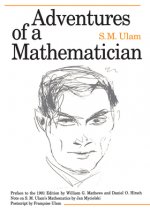
Adventures of a Mathematician
112.31 zł -11 % -
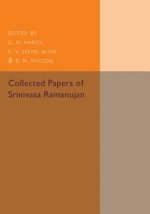
Collected Papers of Srinivasa Ramanujan
330.51 zł -

William Lowell Putnam Mathematical Competition 2001-2016
326.48 zł -4 % -

Prime Obsession
81.69 zł -5 % -

Journey through Genius
81.49 zł -5 % -
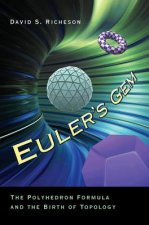
Euler's Gem
86.32 zł -4 % -
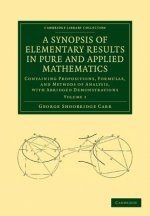
Synopsis of Elementary Results in Pure and Applied Mathematics: Volume 1
234.31 zł -
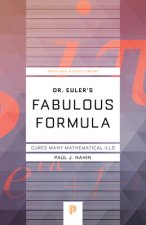
Dr. Euler's Fabulous Formula
101.43 zł -5 % -
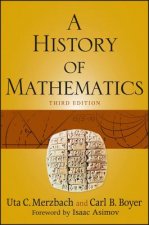
History of Mathematics
173.76 zł -4 % -
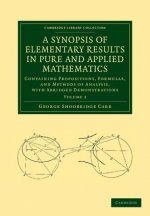
Synopsis of Elementary Results in Pure and Applied Mathematics: Volume 2
455.43 zł -
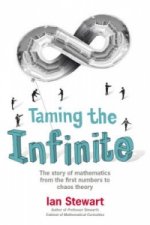
Taming the Infinite
51.87 zł -23 % -
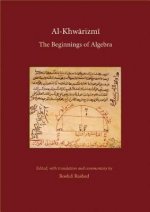
Al Khwarizmi
378.16 zł -10 % -

Math Book
116.24 zł -23 % -
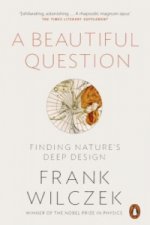
Beautiful Question
61.24 zł -15 % -
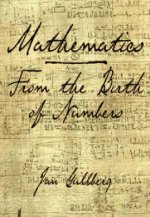
Mathematics
316.01 zł -10 % -
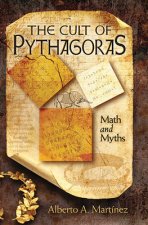
Cult of Pythagoras, The
151.70 zł -1 % -
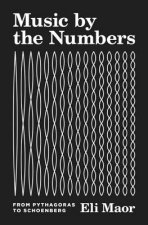
Music by the Numbers
149.89 zł -

History of Mathematics - A Brief Course 3e
866.74 zł -

History of Mathematics: A Very Short Introduction
42.70 zł -23 % -
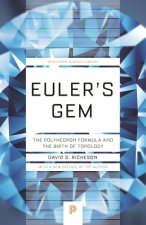
Euler's Gem
93.37 zł -5 % -

Power-Up
195.72 zł -
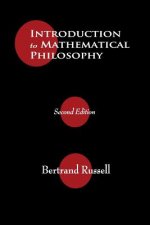
Introduction to Mathematical Philosophy
55.29 zł -

Finding Fibonacci
171.65 zł -
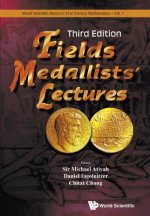
Fields Medallists' Lectures (Third Edition)
312.58 zł -
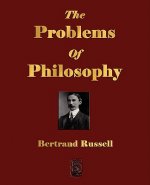
Problems Of Philosophy
53.08 zł -

Collected Works of Bernhard Riemann
175.78 zł -23 % -
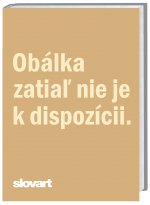
Wonders Beyond Numbers
46.03 zł -35 % -
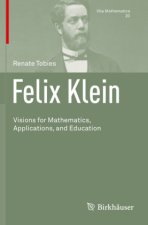
Felix Klein
285.78 zł -
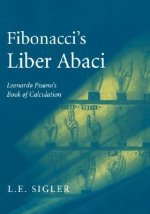
Fibonacci's Liber Abaci
586.29 zł -
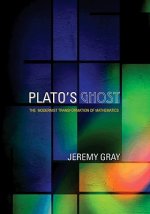
Plato's Ghost
412.71 zł -
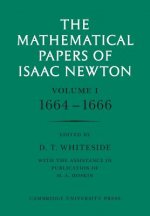
Mathematical Papers of Isaac Newton: Volume 1
360.63 zł -

Leonhard Euler
285.78 zł -
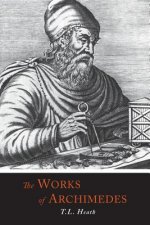
Works of Archimedes
100.63 zł -
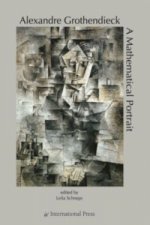
Alexandre Grothendieck
481.92 zł -
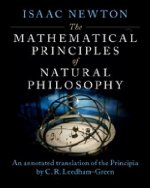
Mathematical Principles of Natural Philosophy
1518.82 zł -
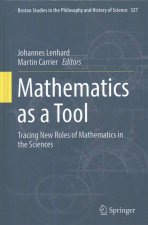
Mathematics as a Tool
588.10 zł -

A Brief History of Mathematics
157.75 zł -4 % -
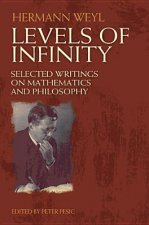
Levels of Infinity
85.52 zł -4 % -
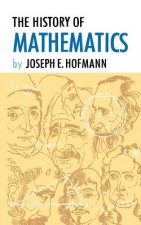
History of Mathematics
66.98 zł -5 % -
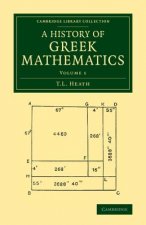
History of Greek Mathematics: Volume 1
323.56 zł -
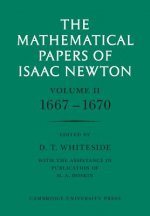
Mathematical Papers of Isaac Newton: Volume 2, 1667-1670
307.85 zł -
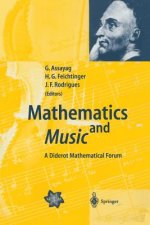
Mathematics and Music
564.63 zł -
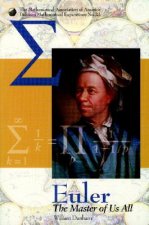
Euler
210.83 zł -
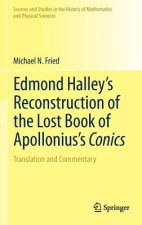
Edmond Halley's Reconstruction of the Lost Book of Apollonius's Conics
639.17 zł -
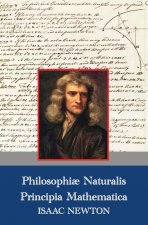
Philosophiae Naturalis Principia Mathematica (Latin,1687)
149.99 zł -
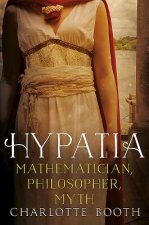
Hypatia
93.17 zł -23 % -
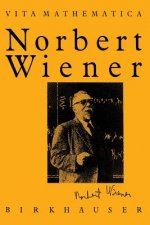
Norbert Wiener 1894-1964
285.78 zł -
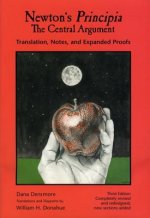
Newton's Principia, the Central Argument
206.50 zł -7 % -
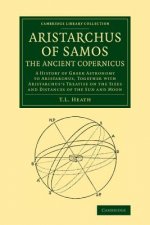
Aristarchus of Samos, the Ancient Copernicus
213.56 zł -4 %
zadowolonych klientów
Od roku 2008 obsłużyliśmy wielu miłośników książek, ale dla nas każdy był tym wyjątkowym.
Copyright! ©2008-24 libristo.pl Wszelkie prawa zastrzeżonePrywatnieCookies



 21 milionów książek
21 milionów książek Dostawa 10.99 zł
Dostawa 10.99 zł (32) 444 93 66 (8-15.30h)
(32) 444 93 66 (8-15.30h)